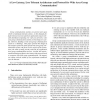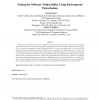DSN
2000
IEEE
14 years 4 months ago
2000
IEEE
ÐWe study the quality of service (QoS) of failure detectors. By QoS, we mean a specification that quantifies 1) how fast the failure detector detects actual failures and 2) how we...
DSN
2000
IEEE
14 years 4 months ago
2000
IEEE
This paper presents a generic methodology to transform a protocol resilient to process crashes into one resilient to arbitrary failures in the case where processes run the same te...
DSN
2000
IEEE
14 years 4 months ago
2000
IEEE
Distributed applications can fail in subtle ways that depend on the state of multiple parts of a system. This complicates the validation of such systems via fault injection, since...
DSN
2000
IEEE
14 years 4 months ago
2000
IEEE
This paper tests the hypothesis that generic recovery techniques, such as process pairs, can survive most application faults without using application-specific information. We ex...
DSN
2000
IEEE
14 years 4 months ago
2000
IEEE
Recent work has shown the advantages of using persistent memory for transaction processing. In particular, the Vista transaction system uses recoverable memory to avoid disk I/O, ...
DSN
2000
IEEE
14 years 4 months ago
2000
IEEE
Group communication systems are proven tools upon which to build fault-tolerant systems. As the demands for fault-tolerance increase and more applications require reliable distrib...
DSN
2000
IEEE
14 years 4 months ago
2000
IEEE
Byzantine quorum systems [13] enhance the availability and efficiency of fault-tolerant replicated services when servers may suffer Byzantine failures. An important limitation of...
DSN
2000
IEEE
14 years 4 months ago
2000
IEEE
We describe an methodology for testing a software system for possible security flaws. Based on the observation that most security flaws are caused by the program’s inappropria...


